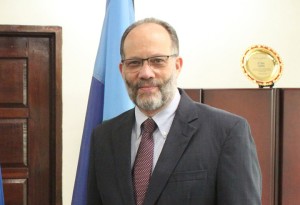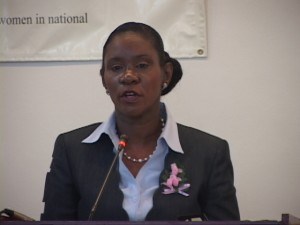The Caribbean Community (CARICOM) once again joins with the rest of the international community in commemorating the United Nations designated International Women's Day. This occasion provides an opportunity to recognize the significant role women have played in the life, livelihood and sustainability of our Region and indeed, in other parts of the world and to record our appreciation therefor.
During the past year, the Region continued to work with the United Nations family to promote Gender Equality, and to implement the various mandates emanating from the Fourth World Conference on Women held in Beijing in 1995. All these activities aim at identifying and overcoming the obstacles to full attainment of human rights for women.
In this regard, significant steps have taken place in the Region. Constitutional reform in Guyana, for example, now requires that in the representation process, one third of the slate of the political party candidates to the March 2001 elections must be women. This requirement results from a process initiated by the CARICOM Secretariat in collaboration with the Commonwealth Secretariat and the Canadian International Development Agency (CIDA), which places emphasis on the preparation of model legislation for the use of Member States in strengthening the legal status of women.
Our women continue to make their mark at home and abroad in the Diaspora. The outstanding performance of our female athletes at the Olympics in Sydney, Australia is most dramatically captured by the Bahamian women victory in the 4×100 relay for women. More recently, Denyse Plummer became the second woman to capture the coveted title of Calypso Monarch at the internationally renowned Carnival in Trinidad and Tobago in February 2001.
In the academic arena, females continue to outperform males. And the increasing prominence of women in virtually all fields augurs well for a future in gender relations so markedly different from that of twenty years ago when the advocacy for women's rights in the UN forum was in its infancy.
Despite the many acknowledged achievements, there remain some unremitting challenges; chief among these is the problem of violence against women. We agree fully with the view expressed by the UN Committee on the elimination of all forms of Discrimination against Women. Gender-based violence against women is a major obstacle to women's enjoyment of their human rights and their equality in all aspects of human life.
I am therefore pleased to note, that in the Caribbean, we have indeed moved beyond the conventional and have initiated legal provisions to deal with domestic violence, and the provision of services such as counseling and shelters for women. However, much more needs to be done to eliminate this violation of women's human rights.
The CARICOM Secretariat is pleased to be associated with the current endeavors to mainstream gender in the national and regional policy-making frameworks. A task force of experts has been commissioned to give direction this year in the operationalisation of a Caribbean Plan of Action for gender equality in collaboration with UNIFEM, UNECLAC, CIDA and DFID. This exercise focuses on violence against women and women's health, in particular the impact of HIV/AIDS on women. It also examines the veracity of the professed under-achievement of males and its effect on gender relations, as well as special issues related to women and work and their job mobility prospects, especially in the context of the CARICOM Single Market and Economy.
As we commemorate this International Women's Day 2001, let us celebrate the achievements of our women and resolve to continue the work of transforming our societies so that gender equality can be truly attained in our Caribbean Community.
In this regard, we must ensure that the benefits to be derived from the creation of a Single Market and Economy redound as much to the women as to the men of the Community.
As Secretary-General of the Caribbean Community I take this opportunity to salute the women of the Community who continue, often under the most difficult circumstances, to nurture the development of our children and youth, especially in these troubling times of the early 21st century.
The Community pledges its continued support to you, the women of the Region.





